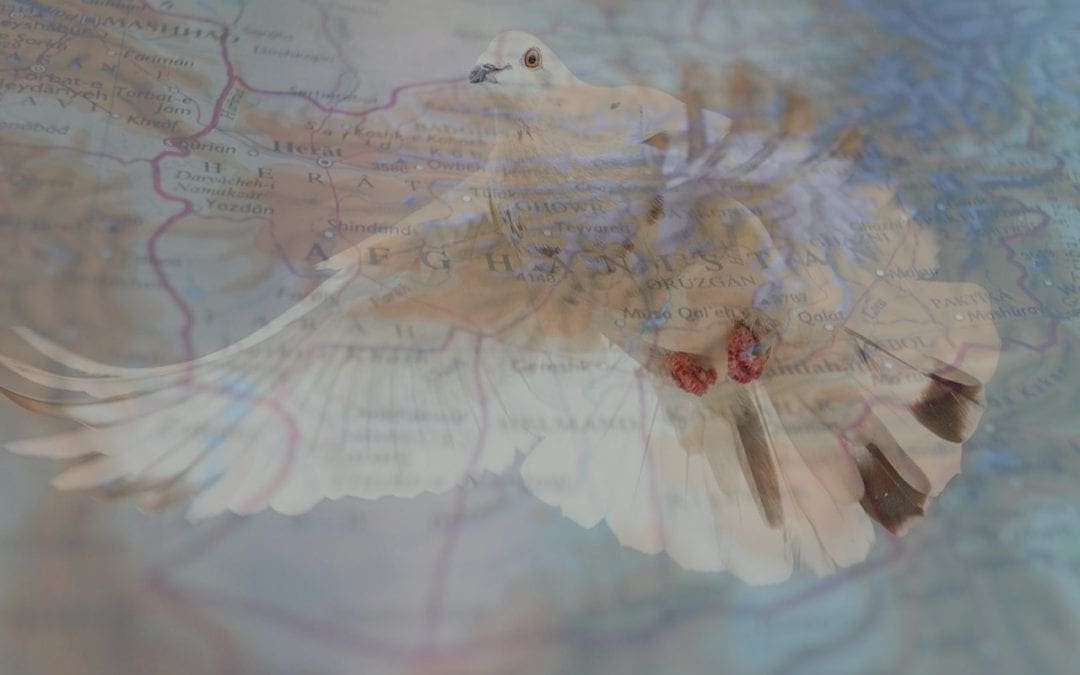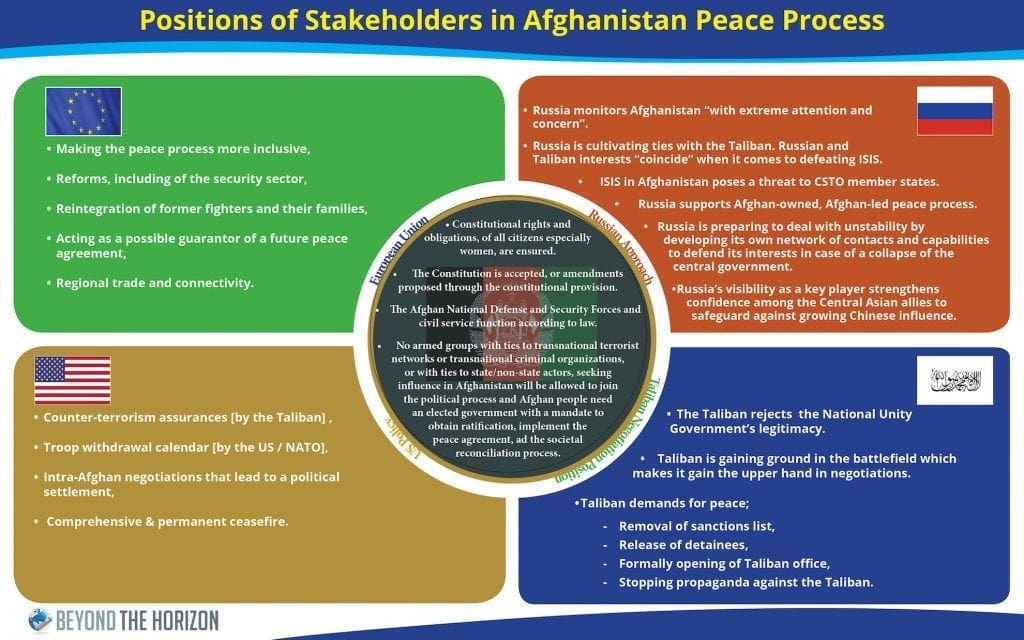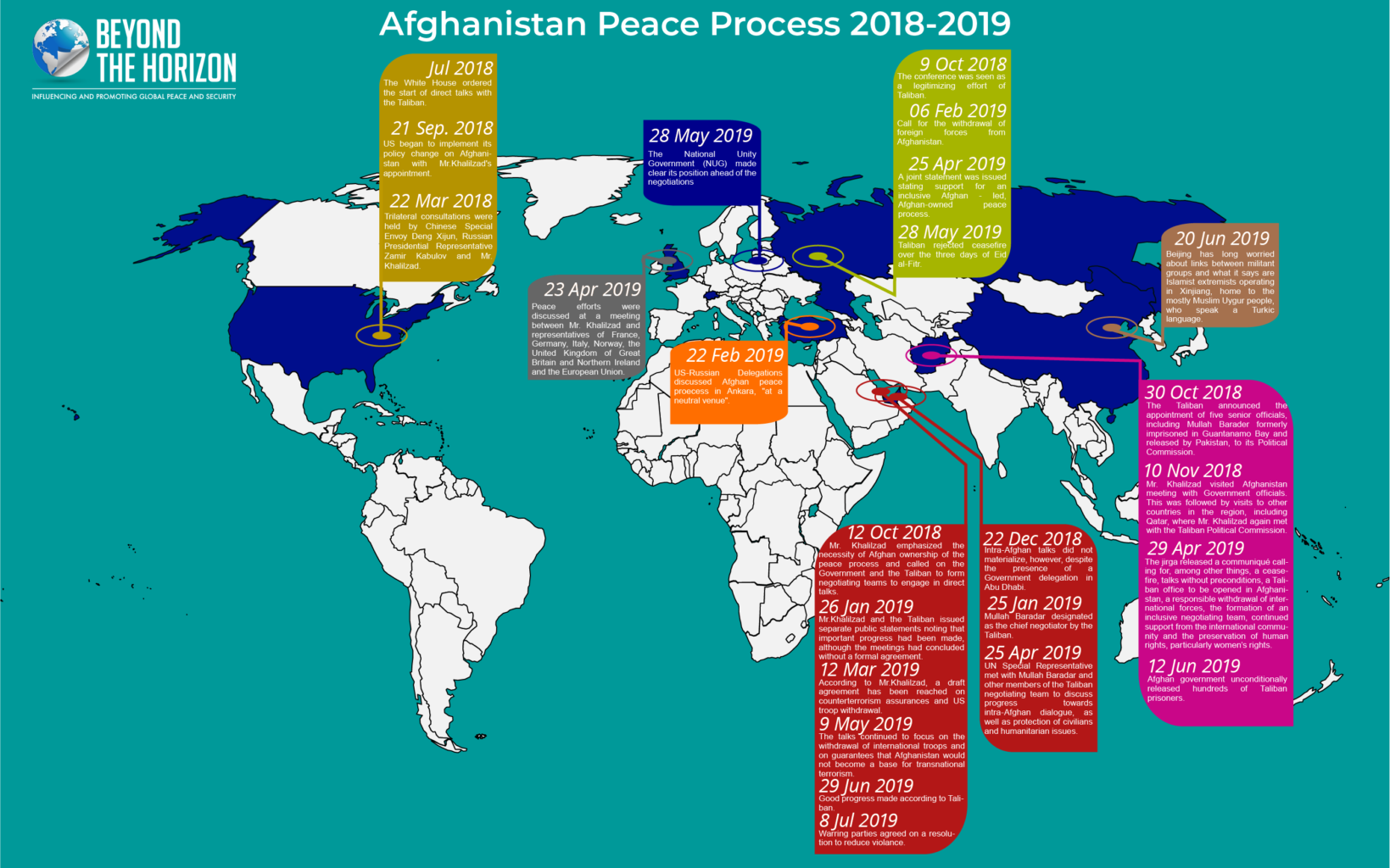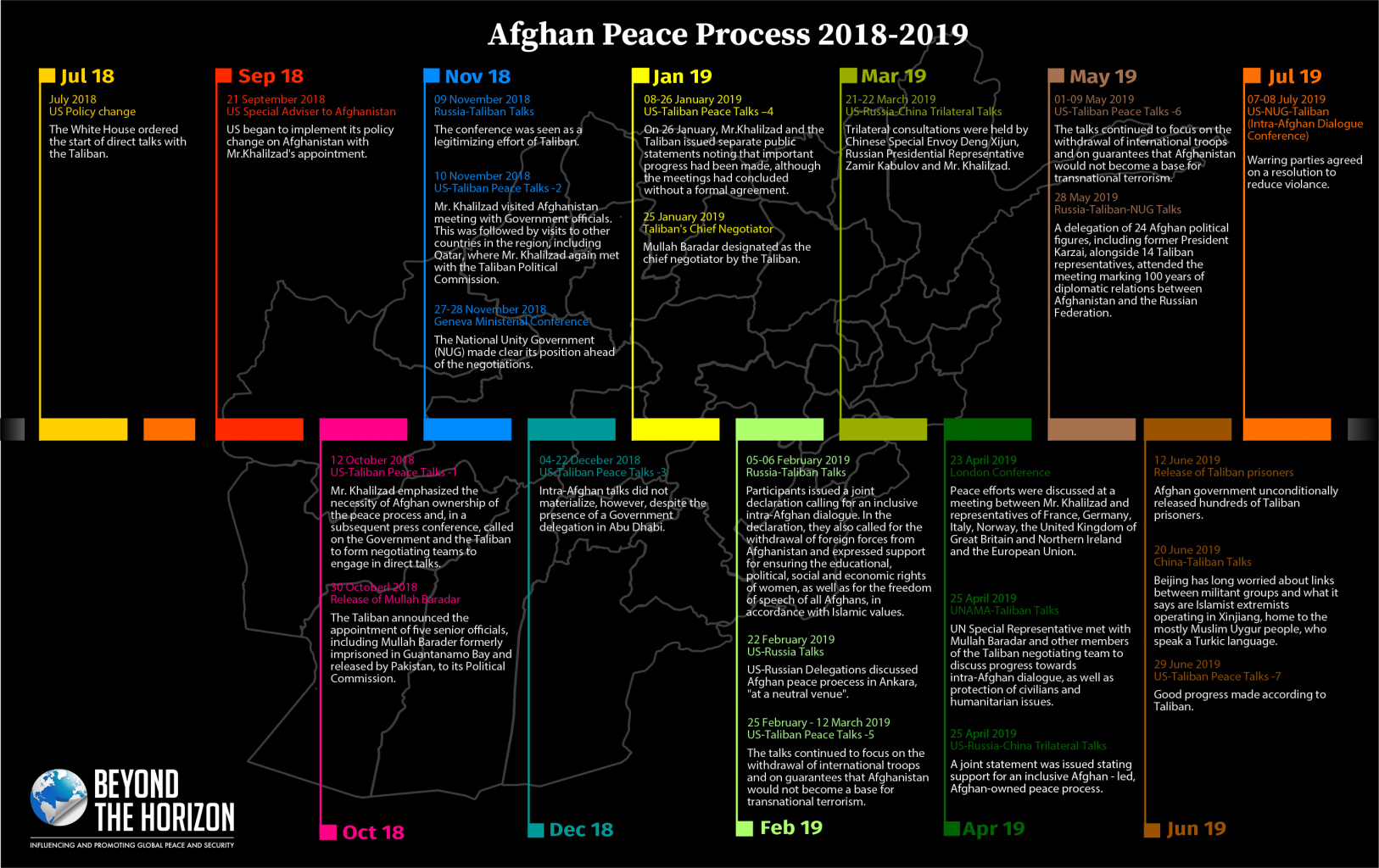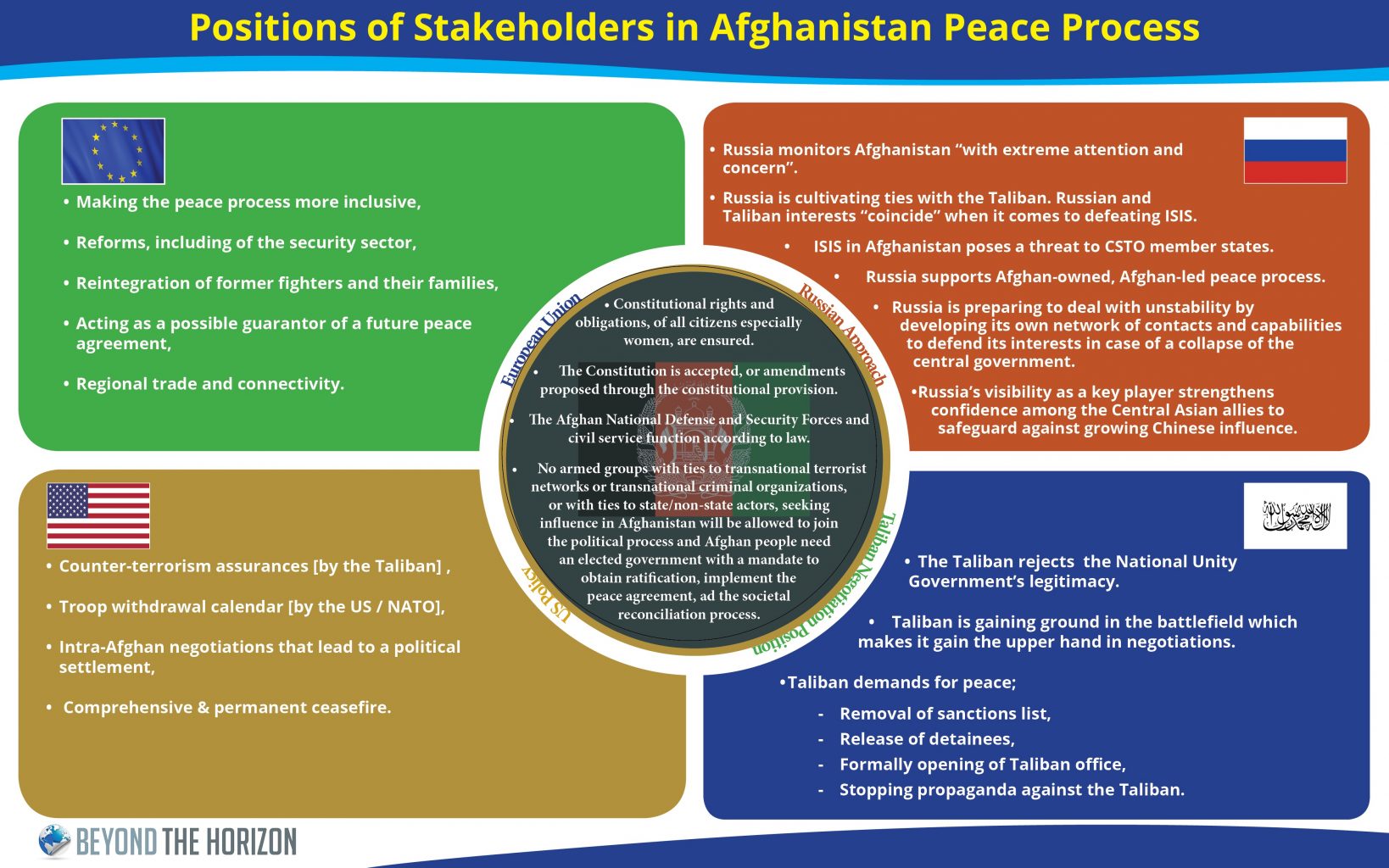If the news from Doha is true, peace is closer than ever. At 29 Jun 2019, the U.S. and the Taliban came together for the seventh round of discussions which will hopefully bring an end to the 18-year-long war between U.S.-led coalition and the Taliban. According to the leaked news, Taliban is pushing for a withdrawal calendar of U.S. and coalition troops in order to initiate negotiations with NUG and it seems that they are succeeding in pursuing their agenda.
Although there have been numerous peace attempts to date, the situation moved forward only after Mr. Zalmay Khalilzad was appointed as Special Representative for Afghanistan Reconciliation. His relentless efforts brought the Taliban to the negotiation table and thanks to his intense multilateral shuttle diplomacy, both U.S. partners and rivals became part of the reconciliation process.
He clearly pointed out the four dimensions of the U.S. policy and managed to keep Taliban within these margins;
- counter-terrorism assurances (by the Taliban),
- troop withdrawal calendar (by the U.S.),
- intra-Afghan negotiations that lead to a political settlement,
- a comprehensive & permanent ceasefire.
The table below shows important milestones and venues in peace process belonging to the last 12 months in chronological order.
| Event | Time | Venue | Outcome/Key Takeaway |
| US Policy Change | July 2018 | Washington | * The White House ordered the start of direct talks with the Taliban. |
| Zalmay Khalilzad Appointed as US Special Adviser to Afghanistan | 21.09.2018 | Washington | * US began to implement its policy change on Afghanistan with Mr.Khalilzad’s appointment. |
| US–Taliban Peace Talks -1 | 12.10.2018 | Doha | * Mr.Khalilzad met for the first time with Taliban representatives. * Mr. Khalilzad emphasized the necessity of Afghan ownership of the peace process and, in a subsequent press conference, called on the Government and the Taliban to form negotiating teams to engage in direct talks. |
| Release of Mullah Baradar | 30.10.2018 | The Taliban announced the appointment of five senior officials, including Mullah Barader formerly imprisoned in Guantanamo Bay and released by Pakistan, to its Political Commission. | |
| Russia–Taliban Talks | 9.11.2018 | Moscow | * The Russian Federation hosted a conference on Afghanistan in Moscow, with representatives from China, India, the Islamic Republic of Iran, Kazakhstan, Kyrgyzstan, Pakistan, Tajikistan, Turkmenistan and Uzbekistan and from the High Peace Council of Afghanistan and the Taliban Political Commission. An embassy official from the United States joined as well. * Taliban representative reiterated the Taliban’s position that the presence of international military forces was the main obstacle to peace in Afghanistan, adding that other issues, including mutual recognition between the Government of Afghanistan and the Taliban, constitutional amendments and women’s rights, could be negotiated once the issue of foreign troops had been resolved. * The Ministry of Foreign Affairs of Afghanistan issued a statement in which it welcomed all efforts towards a peace process in Afghanistan but warned against allowing the Taliban to instrumentalize regional processes. |
| US–Taliban Peace Talks -2 | 10.11.2018 | Kabul | * Mr. Khalilzad visited Afghanistan again, meeting with Government officials and members of the political opposition to discuss his plans for future regional engagement. This was followed by visits to other countries in the region, including Qatar, where Mr. Khalilzad again met with the Taliban Political Commission. |
| Geneva Ministerial Conference | 27.11.2018-28.11.2018 | Geneva | * President Ghani announced that he had established a Government negotiating team, led by his Chief of Staff, Salam Rahimi. * The National Unity Government (NUG) has also made clear its position ahead of the negotiations. The government seek a peace agreement in which the Afghan Taliban would be included in a democratic and inclusive society, respecting the following tenets: • The Constitutional rights and obligations, of all citizens, especially women, are ensured. • The Constitution is accepted, or amendments proposed through the constitutional provision. • The Afghan National Defense and Security Forces and civil service function according to law. • No armed groups with ties to transnational terrorist networks or transnational criminal organizations, or with ties to state/non-state actors, seeking influence in Afghanistan will be allowed to join the political process and Afghan people need an elected government with a mandate to obtain ratification, implement the peace agreement, and lead the societal reconciliation process. * The government envisage a five-phase approach, commencing with an intra-Afghan dialogue, followed by discussions with Pakistan and the United States, followed by participation of regional actors, the Arab-Islamic world, and finally, NATO and non-NATO countries. * It also stresses that presidential elections in spring 2019 are key to successful peace negotiations. Implementation of the peace process will minimally require a period of five years, according to the government. * five areas outlined by the European Union in Geneva: making the peace process more inclusive; reforms, including of the security sector; reintegration of former fighters and their families; acting as a possible guarantor of a future peace agreement; and regional trade and connectivity. |
| US–Taliban Peace Talks -3 | 04.12.2018-22.12.2018 | Abu Dhabi | * Mr. Khalilzad held talks on 17 and 18 December with Taliban representatives in Abu Dhabi and governmental representatives from Pakistan, Saudi Arabia and the United Arab Emirates. * Pakistan facilitated the dialogue. * Intra-Afghan talks did not materialize, however, despite the presence of a Government delegation in Abu Dhabi. |
| US–Taliban Peace Talks -4 | 08.01.2019-26.01.2019 | Doha | * Mr. Khalilzad made a visit to the region from 8 to 26 January, beginning with trips to India and China. On 21 January, he travelled to Qatar for six days of intense negotiations with the Taliban Political Commission, reportedly over the military withdrawal of the United States from Afghanistan and ensuring that the country did not become a haven for international terrorists. * On 26 January, Mr.Khalilzad and the Taliban issued separate public statements noting that important progress had been made, although the meetings had concluded without a formal agreement. * President Ghani subsequently gave a public address on 28 January, in which he portrayed progress in negotiations between the United States and the Taliban as part of an overall framework initiated by the Government of Afghanistan. |
| Mullah Baradar becomes Taliban’s Chief Negotiator | 25.01.2019 | Qatar | * Mullah Baradar designated as the chief negotiator by the Taliban. |
| Russia–Taliban Talks | 05.02.2019-06.02.2019 | Moscow | * 10-member Taliban delegation and a number of Afghan political figures, many affiliated with opposition positions, including former President Hamid Karzai and several presidential and vice-presidential candidates, as well as several former Taliban members attended a meeting organised by Russia. * Two women participated in the meeting. * At the conclusion of the conference, participants issued a joint declaration calling for an inclusive intra-Afghan dialogue. In the declaration, they also called for the withdrawal of foreign forces from Afghanistan and expressed support for ensuring the educational, political, social and economic rights of women, as well as for the freedom of speech of all Afghans, in accordance with Islamic values. |
| US–Russia Talks | 22.02.2019 | Ankara | * US–Russian Delegations discussed Afghan peace proecess in Ankara, “at a neutral venue”. |
| US–Taliban Peace Talks -5 | 25.02.2019 – 12.03.2019 | Doha | * Mr. Khalilzad held talks with the Taliban in Doha from 25 February to 12 March. * The talks continued to focus on the withdrawal of international troops and on guarantees that Afghanistan would not become a base for transnational terrorism. * According to Mr.Khalilzad, a draft agreement has been reached on counterterrorism assurances and US troop withdrawal. |
| US–Russia–China Trilateral Talks | 21.03.2019-22.03.2019 | Washington | * Trilateral consultations were held by Chinese Special Envoy Deng Xijun, Russian Presidential Representative Zamir Kabulov and Mr. Khalilzad. |
| London Conference | 23.04.2019 | London | * Peace efforts were discussed at a meeting between Mr. Khalilzad and representatives of France, Germany, Italy, Norway, the United Kingdom of Great Britain and Northern Ireland and the European Union. |
| UNAMA–Taliban Talks | 25.04.2019 | Qatar | * UN Special Representative met with Mullah Baradar and other members of the Taliban negotiating team to discuss progress towards intra-Afghan dialogue, as well as protection of civilians and humanitarian issues. |
| US–Russia–China Trilateral Talks | 25.04.2019 | Moscow | * A joint statement was issued stating support for an inclusive Afghan – led, Afghan-owned peace process. 1. The three sides respect the sovereignty, independence, and territorial integrity of Afghanistan as well as its right to choose its development path. The three sides prioritize the interests of the Afghan people in promoting a peace process. 2. The three sides support an inclusive Afghan-led, Afghan-owned peace process and are ready to provide necessary assistance. The three sides encourage the Afghan Taliban to participate in peace talks with a broad, representative Afghan delegation that includes the government as soon as possible. Toward this end, and as agreed in Moscow in February 2019, we support a second round of intra-Afghan dialogue in Doha (Qatar). 3. The three sides support the Afghan government efforts to combat international terrorism and extremist organizations in Afghanistan. They take note of the Afghan Taliban’s commitment to: fight ISIS and cut ties with Al-Qaeda, ETIM, and other international terrorist groups; ensure the areas they control will not be used to threaten any other country; and call on them to prevent terrorist recruiting, training, and fundraising, and expel any known terrorists. 4. The three sides recognize the Afghan people’s strong desire for a comprehensive ceasefire. As a first step, we call on all parties to agree on immediate and concrete steps to reduce violence. 5. The three sides stress the importance of fighting illegal drug production and trafficking, and call on the Afghan government and the Taliban to take all the necessary steps to eliminate the drug threat in Afghanistan. 6. The three sides call for an orderly and responsible withdrawal of foreign troops from Afghanistan as part of the overall peace process. 7. The three sides call for regional countries to support this trilateral consensus and are ready to build a more extensive regional and international consensus on Afghanistan. 8. The three sides agreed on a phased expansion of their consultations before the next trilateral meeting in Beijing. The date and composition of the meeting will be agreed upon through diplomatic channels. |
| Consultative Loya Jirga | 29.04.2019 | Kabul | * More than 3,000 delegates from across the country attended the five-day jirga (“assembly”) which was aimed at developing the parameters for talks with the Taliban. * Chief Executive Abdullah Abdullah, as well as major opposition politicians, including presidential candidates, boycotted the event, claiming that it was intended to bolster President Ghani’s re-election campaign. * The jirga released a communiqué calling for, among other things, a ceasefire, talks without preconditions, a Taliban office to be opened in Afghanistan, a responsible withdrawal of international forces, the formation of an inclusive negotiating team, continued support from the international community and the preservation of human rights, particularly women’s rights. * In his closing speech, Mr. Ghani repeated that he was willing to call for a ceasefire if the Taliban reciprocated, and offered to release 175 Taliban prisoners as a confidencebuilding measure. * The Taliban rejected the jirga outcome and the call for a ceasefire in a statement on 3 May. |
| US–Taliban Peace Talks -6 | 01.05.2019 – 09.05.2019 | Doha | * Domestic and international stakeholders attempted to organize an intra-Afghan dialogue. However, preparations for the meeting unravelled amid disputes over the list of participants. * The talks continued to focus on the withdrawal of international troops and on guarantees that Afghanistan would not become a base for transnational terrorism. |
| Russia–Taliban–NUG Talks | 28.05.2019 | Moscow | * A delegation of 24 Afghan political figures, including former President Karzai, alongside 14 Taliban representatives, attended the meeting marking 100 years of diplomatic relations between Afghanistan and the Russian Federation. * The Taliban delegation was led by Mullah Abdul Ghani Baradar, who had been appointed as the Head of the Taliban Political Commission and a Deputy Leader of the movement in January 2019. * Taliban rejected ceasefire over the three days of Eid al-Fitr. |
| Release of Taliban prisoners | 12.06.2019 | Kabul | * Afghan government unconditionally released hundreds of Taliban prisoners. |
| China–Taliban Talks | 20.06.2019 | Beijing | * China supports Afghans resolving their problems themselves through talks. * China’s far western region of Xinjiang shares a short border with Afghanistan. * Beijing has long worried about links between militant groups and what it says are Islamist extremists operating in Xinjiang, home to the mostly Muslim Uygur people, who speak a Turkic language. |
| US–Taliban Peace Talks -7 | 29.06.2019 -ongoing | Doha | * Mr. Khalilzad called the talks as “the most productive session” and “substantive progress made” on all four parts of a peace agreement. * Talks will resume after intra-Afghan dialogue. |
| US–NUG–Taliban (Intra-Afghan Dialogue Conference) | 07.07.2019-08.07.2019 | Doha | * Germany co-sponsored the talks with Qatar. * There was no official government representation. Those attending participated only in their personal capacity and on an equal footing. * Warring parties agreed on a resolution to reduce violance. |
Following chart gives an idea about the main actors’ negotiation positions. (Click here to download High Quality)
Germany and Norway’s involvement is of particular importance but more important thing is an inclusive forum that takes into consideration other players’ concerns. Mr.Khalilzad’s efforts are about to blossom with strong political will and support from the U.S. administration. As 2020 elections approach, the U.S. administration is trying to gain credit at domestic front by showing troops going back home.
The seventh round of US-Taliban talks followed by an intra-Afghan session which was held last weekend as casualties hit fighting season high in Afghan theatre. Taliban’s effectiveness in the battlefield makes things harder for the NUG. Alongside heavy casualties and attrition ANDSF suffers, the Afghan government is unable to administer 64 districts from the district centers, reportedly. This strengthens the Taliban’s hand for sure. Just to make things worse, presidential elections which were originally scheduled for 20 April 2019 have been postponed to 28 September 2019 in order not to hamper reconciliation process and to give peace a chance. This raises legitimacy concerns for Mr. Ashraf Ghani.
Latest Kabul attack which left six people dead and 105 others wounded, including women and children for which the Taliban claimed responsibility is yet another clear violation of the law of armed conflict. Sooner or later the group will face its consequences.
* Samet Coban is analysts at Beyond the Horizon ISSG.

